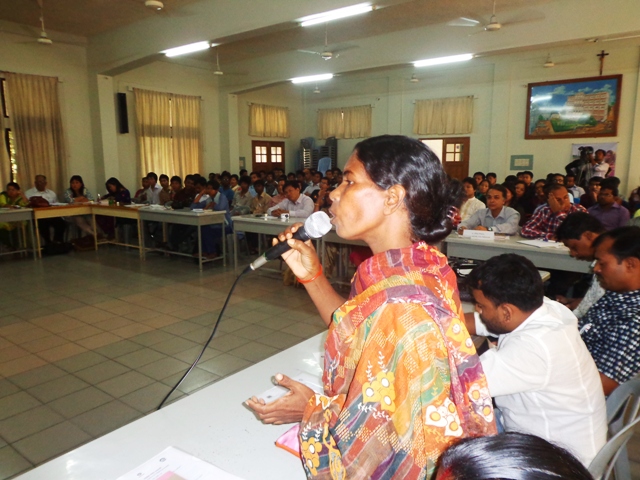Public Hearing on Human Rights Situation of Indigenous Peoples

In cooperation with European Union and Oxfam, Institute for Environment and Development in collaboration with Kapaeeng Foundation, Sampriti Mancha and Janoudyog organized a public hearing on human rights situation of Indigenous Peoples on November 2, 2013 at CBCB center, Asad Avenue in Dhaka. Chaired by Numna Ahmedh Khan Executive Director of IED, the event graced by honorable state minister Advocate Promode Mankin, MP, Ministry of social welfare as chief guest, Prof. Dr. Mizanur Rahman, chairman, national human rights commission, as chief observer and Prof. Dr. Sadeka Halim, Information commissoner, Information commission Bangladesh as special guest. The event included six victims of human rights violence from plain land and hill tracts areas, journalists from print and electronic media, development activist, youths, university teachers, indigenous leaders & youth, students, partners, donors, lawyers and other rights activist as well.
Numan Ahmed Khan, Executive Director of IED thanked the audience for attending the public hearing and asking continuous support and stand aside of Indigenous and marginalised peoples.
Moderated by Prof. Robaet Ferdous, University of Dhaka, the concept note read out by Razib Mir, assistant professor of Jagannath University. In the concept note the presenter highlights the human rights situation of Indigenous peoples in Bangladesh through emperical evidences and gradual decadence of human condition.
In this stage, victims of plain and hill tracts area shared their struggles, miseries among guests and house. While talking the human rights violation situation, tears roll down from the cheek of Bahamai Hasda, who came from Noagaon to unveil her mishap to authority concern through media and attended guest. Then she said, land grabbers forcefully occupied our cultivable land and sent off my brothers to India, leaving me alone in ancestors land. Now I pass days with sever panic, threat from the influential peoples.
My recorded land was grabbed by the local elite. I lodge case against them in court which is still pending way, said Aliberikush Mardy hailed from Bulakipur of Ghoraghat upazila under Dinajpur district
Binoy Oraon came from Noagaon district to share his hardship and sorrow in public hearing event. He said in the Bangla month of Falgun, perpetrators and criminal killed my son and has been waiting for long time to get justice of his beloved son’s murder case but the real criminal are not arrested yet.
Chingla Maung Chak came from Naikhyangchary, Bandarban and shared his tragic story among the audience. He said Chak indigenous peoples have living this land more than 25 years back but very recently settlers with the help of local influential forcefully evicted our community. We want to get back our ancestral land from the occupiered groups.
Farzana Rupa, journalist of Ekattor television said, to resolve the human rights abuse case of indigenous peoples, we should take 10 cases under consideration as trial basis for rudimentary level. Biplop Rahman, journalist, Kalerkantha unless the indigenous people strengthen their muscles and voices, they will not enjoy the human rights as human being.
During discussion about the issues of human rights abuse facing indigenous peoples Advocate Mankin MP, ministry of social welfare, chief guest of the hearing told, present government is more indigenous friendly than to any other government in the history of Bangladesh, hence has given recognition to the indigenous peoples as “ethnic minority” in the constitution. For the sake of indigenous peoples the current constitution can If the constitution can be amended for 15 times, it is possible to be amended for 16 times for the sake of the rights of indigenous peoples, Mankin added.
Chairman of national human rights commission Dr. Mizanur Rahman noted that indigenous peoples are the worst sufferer of human rights violation issues and called the political parties to give up violent politics qouting, ‘please act the politics for the welbeing of general people avoiding chaos and cruelty. We do not want the politics that raise the number of dead body.’ The existing land act does not recognise the customary rights of indigenous peoples, mentioned information commissioner prof. Dr. Sadeka Halim and to resolve this problem govt. should recognise the indigenous peoples in our holly constitution.
The public hearing addressed by Saikat Biswas, project coordinator of Oxfam, prof. Dr. Sourav Shikdar, Dhaka University, Advocate Titus Hillol Rema, Assistant atorney general of Bangladesh, Rabindranath Soren, president of Jatiyo Adivasi Parishad, Sanjeeb Drong, general secretary of Bangladesh Indigenous Peoples Forum as well.

